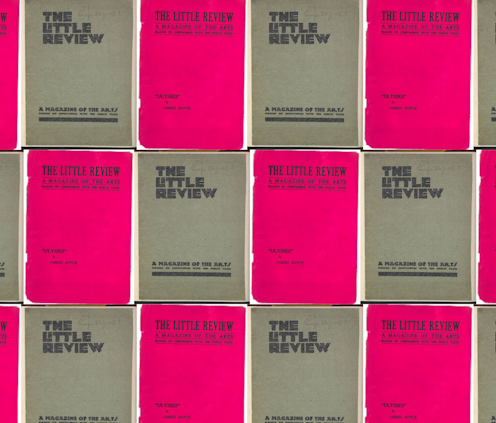
James Joyce’s Ulysses, which turns 100 this February, is now central to the literary canon and features on university literature courses around the world. However, it was not always as revered as it is now. In fact, it was banned as obscene before it was first published as a complete novel, regarded as a work of perversion.
Ulysses was initially published in instalments in the US literary magazine The Little Review. The chapter that became known as “Nausicaa” features the novel’s main character, Leopold Bloom, masturbating on a beach while gazing at a 17-year-old girl called Gerty McDowell.
It was this episode, published in 1920, that caught the attention of the daughter of a New York lawyer, who referred it to the New York Society for the Suppression of Vice. A prosecution was launched.
The editors of the Little Review were taken to court and fined for publishing an obscene work. The decision meant that US publishers were prohibited from publishing Ulysses. Other countries, including the UK, followed suit.
It was only in Paris in 1922 that Ulysses was finally published as a complete novel through the independent publisher Sylvia Beach.
Divided views
The New York decision to ban Ulysses split global opinion. For many readers, as well as Joyce’s literary contemporaries including W.B. Yeats, T.S. Eliot, D.H. Lawrence and Ezra Pound, the idea that Joyce’s experimental work had been banned as obscene was absurd. For many legislators, journalists and other readers, the book was pornographic and blasphemous.
Read more: Ulysses at 100: why Joyce was so obsessed with the perfect blue cover
Ulysses, by the standards of the day, was extremely sexually explicit, showing Bloom being fisted in a brothel and his wife Molly musing on the joys of being “fucked” hard by her lover. As well as being a vast collection of literary and religious quotations and everyday trivia, it is also an encyclopaedia of obscene words. And it was blasphemous, beginning with the character Buck Mulligan mocking the rituals of the Catholic Church.

The book also broke new ground formally. It was radically experimental, which involved new literary techniques, such as that of the interior monologue, and a range of different styles, including a section written as a play script, and another written in the style of a newspaper front page.
Ulysses was not the only modernist novel to combine formal experimentalism and sexually explicit content, and many others books, such as Lawrence’s The Rainbow, were also censored as obscene. The combination of formal and sexual shock-effects has shaped 20th-century literature.
The freedom to express?
Even after the US courts lifted the ban on Ulysses in 1934 and the obscenity laws changed in many countries, including in 1959 in the UK, novels continued to fall foul of the law. As such, 20th and 21st century world literature has often involved a combative relationship to the law. The conflation of literary value with iconoclasm has been a tenacious one.
But perhaps less obviously, the free speech arguments made in defence of Ulysses and other censored modernist texts have also shaped subsequent debates about literature’s rights to freedom of expression.
Read more: Ulysses at 100: why Joyce was so obsessed with the perfect blue cover
One argument made by T.S. Eliot at the time was that the censorship of modernist books, including Ulysses, was based on a category mistake. Literature and pornography were mutually exclusive terms. This often rested on strong claims for the book’s specific literary credentials.
Ulysses, they claimed, with its experimentation, parallels with Homer’s Odyssey and playful language, was a highly crafted literary artefact. As an autonomous literary work, it was disconnected from causal effects such as the incitement to sexual stimulation, which was one way of describing the effects of pornography.
A different argument by poet Ezra Pound was to stress that the sexual details in novels formed part of their realism.
Ulysses includes meticulous descriptions of Dublin geography, buildings, conversations and people. Bodily functions, including sexual activities, were features of the ordinary lives of ordinary people on an ordinary day in Ireland in June 1904. If countries including Ireland, the UK and the US wanted to have a meaningful cultural sphere, then novels needed to be able realistically to represent adult themes.
These arguments in defence of the literary text view its effects on readers differently. One stresses literature’s formal autonomy and downplays its ability to produce direct causal effects in the world. The other attends to literature’s important role in mirroring reality and telling the truth about ordinary life.
Of course, the meanings of literary texts always mutate as they travel through time and space and encounter new readers. The words that once shocked many readers do so no longer, while words that to many at the time seemed innocuous now make readers recoil.
One hundred years after the publication of Ulysses in 1922, the idea of banning it may seem absurd. But with literary texts being censored in many parts of the world, arguments in defence of free expression continue to mobilise claims about the particular status and power of literature.
rachel.potter@uea.ac.uk has received funding from the AHRC (the Arts and Humanities Research Council), for a project on the history of the writers' organisation International PEN and its defence of freedom of expression. She is a member of English PEN, which is a charity.
This article was originally published on The Conversation. Read the original article.







